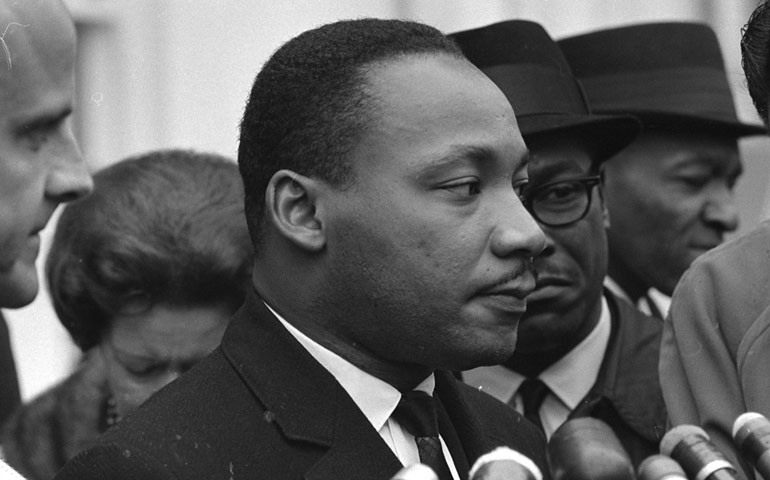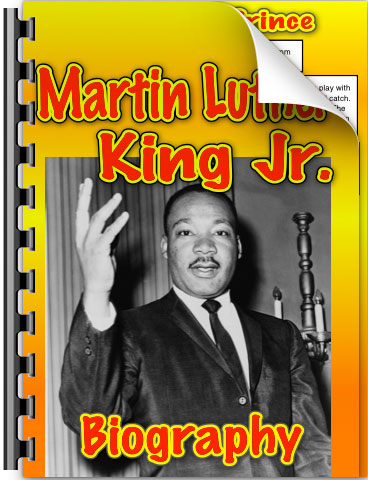Martin Luther King, Jr

Martin Luther King.
Martin Luther King Jr. was born on January 15, 1929 in Atlanta, Georgia, to a religious family. King was a good student at school and college, but he was at first unsure about what to do afterwards. However, he later decided to start a religious career, like his father.
While at Morehouse College, King became increasingly spiritual, and he was influenced by the college president, who promoted racial equality. While he was still studying, King became pastor of the Dexter Avenue Baptist Church in Montgomery, Alabama.
It was in Montgomery in 1955 that Rosa Parks refused to give up her seat to white people on a bus, and she was arrested and fined. This sparked action from civil rights leaders in the area, including Martin Luther King. He gave a speech encouraging a boycott of buses in Alabama as a protest against segregation along racial lines.
For over a year, black people did not use bus services, and this act of protest angered some people. Even King's house came under attack. But the boycott led to Montgomery changing the law so that segregation on public transport in the city was no longer compulsory.
After this, King and other civil rights and church leaders got together to push for wider protests against racial prejudice. King was inspired by figures such as Mahatma Gandhi to use non-violent methods to drive social change.
As King became more and more widely known, he and others took part in more and more peaceful protests. During this time, King was arrested, and even put in jail at one point.
In 1963, a demonstration took place in Birmingham, Alabama, which King had organized. Huge crowds turned up, with people even bringing along their children. The police expected trouble and dispersed the crowds with water and dogs, which led some people to accuse King of putting children's lives at risk. However, King stuck by his principles of non-violent protest.
Here is the famous part of the "I have a dream" speech, which was actually 17-minutes long. It was given given in front of the Lincoln Memorial during the 1963 March on Washington for Jobs and Freedom. The speech's most famous passage was not part of the prepared text, and was impromptu, making it all the more powerful.
"I say to you today, my friends, so even though we face the difficulties of today and tomorrow, I still have a dream. It is a dream deeply rooted in the American dream.
I have a dream that one day this nation will rise up and live out the true meaning of its creed: 'We hold these truths to be self-evident: that all men are created equal.'
I have a dream that one day on the red hills of Georgia the sons of former slaves and the sons of former slave owners will be able to sit down together at the table of brotherhood.
I have a dream that one day even the state of Mississippi, a state sweltering with the heat of injustice, sweltering with the heat of oppression, will be transformed into an oasis of freedom and justice.
I have a dream that my four little children will one day live in a nation where they will not be judged by the color of their skin but by the content of their character.
I have a dream today.
I have a dream that one day, down in Alabama, with its vicious racists, with its governor having his lips dripping with the words of interposition and nullification; one day right there in Alabama, little black boys and black girls will be able to join hands with little white boys and white girls as sisters and brothers.
I have a dream today.
"
"I Have a Dream" is regarded as one of the finest speeches in the history of America. It was vital as a springboard to getting the Civil Rights Act of 1964 passed into law in the United States.
In 1968, King was planning a national occupation of Washington, D.C., to be called the Poor People's Campaign, when he was assassinated on April 4 in Memphis, Tennessee. He was just 39 years old.
The day before On April 3, King addressed a rally and delivered his "I've Been to the Mountaintop" address at Mason Temple, the world headquarters of the Church of God in Christ. King's flight to Memphis had been delayed by a bomb threat against his plane. During his last speech King was well aware of the death threats against him. King said:
And then I got to Memphis. And some began to say the threats, or talk about the threats that were out. What would happen to me from some of our sick white brothers?
"Well, I don't know what will happen now. We've got some difficult days ahead. But it doesn't matter with me now. Because I've been to the mountaintop. And I don't mind. Like anybody, I would like to live a long life. Longevity has its place. But I'm not concerned about that now. I just want to do God's will. And He's allowed me to go up to the mountain. And I've looked over. And I've seen the promised land. I may not get there with you. But I want you to know tonight, that we, as a people, will get to the promised land. So I'm happy, tonight. I'm not worried about anything. I'm not fearing any man. Mine eyes have seen the glory of the coming of the Lord."
Just a few days after King's assassination, Congress passed the Civil Rights Act of 1968.
From 1971, some cities began to have annual holidays to honor King. At the White House Rose Garden on November 2, 1983, President Ronald Reagan signed a bill creating a federal holiday to honor King. It was observed for the first time on January 20, 1986, and it is called Martin Luther King Jr. Day. The holiday is now observed on the third Monday of January each year, near the time of King's birthday in all fifty U.S. states.



